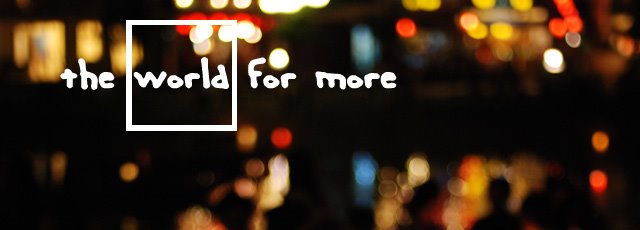Wednesday, February 27, 2008
lines, dots, and words
The cold drifts in, I can feel it in my breath. Sprawled across the floor in this box is an idea--withering away quickly like weathered sand. It has some form, but not to where I can grasp it to keep it from de-materializing. I've got it now! I'll give this abstraction a name--but what? Something unusual, memorable, yet comprehensible. Drats! Where did it go? It was here a second ago.
Tuesday, February 12, 2008
agency over structure or vice versa
structure - theoretical concept, certain properties of society as having causal power
agency - theoretical concept, certain properties of the individual as having causal power
Does the individual have the capacity to change and create society anew through his/her causal action, or does society determine the individual's behavior through its normative causal action? The first view is associated with the Symbolic Interactionist school of thought wherein individuals have the capacity to develop their own creative capital through social interaction in order to attach meaning to objects, ideas, organizations, and other tangible and intangible systems. Meanwhile, the latter view is associated with Structural Functionalist school of thought which bears some resemblance to evolutionary theory wherein societal practices come into being for the benefit of larger society--here, the individual actor does not matter as much as the achievement of an ends.
The second view could be considered as being subjective and ethnocentric in terms of supposed benefit of larger society--e.g., this lens of viewing the world's social structures supposes that globalization in terms of forced modernization and urbanization is bound to happen sooner or later, perhaps leading to capitalistic consumer societies, but not necessarily the development of civil societies. In this instance, the mediation process of social interactions between individuals is the byproduct of broad systemic and even commercialized norms. Furthermore, it generalizes human behavior as lacking in free will and disregards the concept of human intention.
On the other hand, the first view supposes that an individual has the potential to change/influence/create society anew. In this sense, the individual has the potential to develop new meanings through social interaction and creative expression. Similarly, individual human inquiry can have an impact on broader social norms leading to multiple concurrent realities, none of which are necessarily more correct than the others. Moreover, the individual has the capacity to influence/manipulate others in order to achieve an ends, self-interested or collective. As such, this view allows for a broader range of variability, if not conflict, among humanity and does not necessitate one end result.
Are the strings of influence unavoidable in terms of seeking to create individual sovereignty and identity?
agency - theoretical concept, certain properties of the individual as having causal power
Does the individual have the capacity to change and create society anew through his/her causal action, or does society determine the individual's behavior through its normative causal action? The first view is associated with the Symbolic Interactionist school of thought wherein individuals have the capacity to develop their own creative capital through social interaction in order to attach meaning to objects, ideas, organizations, and other tangible and intangible systems. Meanwhile, the latter view is associated with Structural Functionalist school of thought which bears some resemblance to evolutionary theory wherein societal practices come into being for the benefit of larger society--here, the individual actor does not matter as much as the achievement of an ends.
The second view could be considered as being subjective and ethnocentric in terms of supposed benefit of larger society--e.g., this lens of viewing the world's social structures supposes that globalization in terms of forced modernization and urbanization is bound to happen sooner or later, perhaps leading to capitalistic consumer societies, but not necessarily the development of civil societies. In this instance, the mediation process of social interactions between individuals is the byproduct of broad systemic and even commercialized norms. Furthermore, it generalizes human behavior as lacking in free will and disregards the concept of human intention.
On the other hand, the first view supposes that an individual has the potential to change/influence/create society anew. In this sense, the individual has the potential to develop new meanings through social interaction and creative expression. Similarly, individual human inquiry can have an impact on broader social norms leading to multiple concurrent realities, none of which are necessarily more correct than the others. Moreover, the individual has the capacity to influence/manipulate others in order to achieve an ends, self-interested or collective. As such, this view allows for a broader range of variability, if not conflict, among humanity and does not necessitate one end result.
Are the strings of influence unavoidable in terms of seeking to create individual sovereignty and identity?
Subscribe to:
Comments (Atom)

